Advertisement
An 11-Pose Prenatal Yoga Sequence For A Blissful Birth

There are so many benefits to practicing yoga as an expectant and new mama — from improved circulation and firming of the skin, to strengthening of the muscles and connective tissue, to stimulating lymphatic flow.
As a doula and a prenatal yoga teacher, I recommend a regular practice of three days per week. Yoga is not just about asanas; it’s about softening, a dance of effort and surrender, and deep listening to your body. We are holding the intention for a healthy, vibrant pregnancy.
In labor, yoga can help connect you with your breath, move the labor along with more ease and awareness, teach you to be more in tune with your body, and help you harness the power of your voice. We often chant in prenatal classes as an opportunity to become familiar with your inner “Om.”
Try this Mama Glow Yoga prenatal sequence to lead you to a smooth and blissful birth:
“Shakti’s Seat” or Bound Angle Pose (Baddha Konasana)
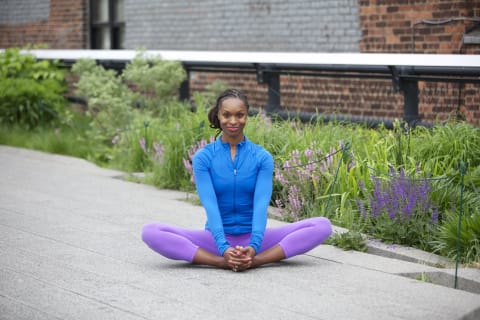
This pose provides a great stretch for groin muscles, helps to strengthen and tone the muscles used for labor, increasing flexibility of knees and inner thighs and keeps the spine in alignment.
Sit comfortably on a mat, cushion or blanket with your spine tall and draw your shoulders down the back. Bring the soles of the feet together and allow the knees to fall to either side. Interlace fingers around feet, cradling the toes.
Ground yourself in this pose with the affirmation: “I am grounded, relaxed, and open, like a lotus blossom.” Hold the pose for 5 breaths.
Cat and Cow (Marjaryasana + Bitilasana)
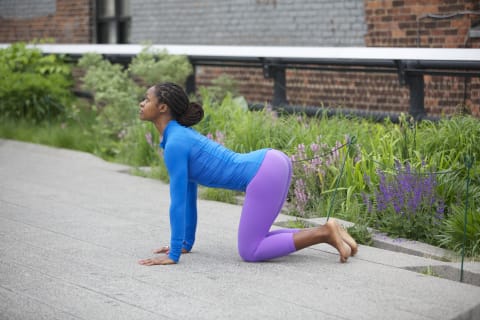
These poses stretch the lower spine, hips, back and core muscles. They also open the chest and lungs allowing for easier breathing, and may also improve posture and promote a healthy flexible spine.
Move to your hands and knees in a tabletop position. Stack your shoulders over your wrists and spread the palm of each hand wide onto your mat with your hands shoulder-distance apart. Keep the neck as a natural extension of the spine, and bring your gaze to the floor.
Inhale and curl your toes under, lifting your tailbone and chest toward the ceiling while dropping your belly toward the floor. Let the scooping movement in the spine initiate from the tailbone. On the exhale, release the tops of the feet to the floor, rounding through the spine and drawing the navel in, stretching through the tops of the shoulders.
Repeat for 10 cycles, letting your breath govern the movement.
Downward-Dog (Adho Mukha Svanasana)
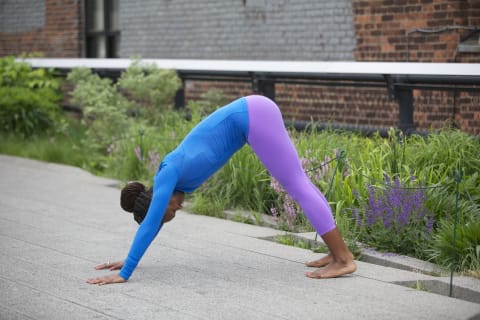
This pose strengthens arms; improves hip flexibility; tones the outer hips; stretches the hamstrings, calves, and thighs; and stimulates the liver and kidneys.
From Cat/Cow, spread your palms and press your hands firmly into the mat. Send your hips up and back until you in an inverted V-shape. Lower your heels toward the floor as much as you can. Square the hips and face toes toward the floor, and lift your navel in toward your spine.
When you’re further along in your pregnancy, use blocks to modify, bringing the floor closer to you.
Hold for 3 breaths.
Downward-Dog Pliés
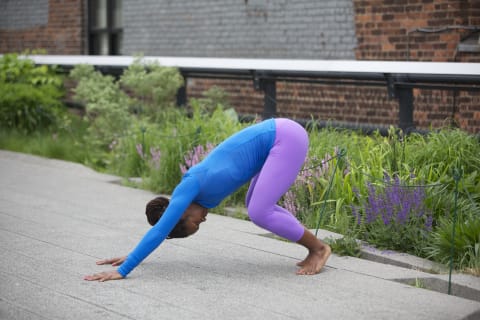
This movement combines the most basic yoga pose with the most fundamental ballet pose — the plié. It tones the inner and outer thighs and stretches the hamstrings and calves, while also working the muscles of the back and upper arms, shoulders and wrists.
From Downward Dog, turn your heels together and let your toes turn out into a V-shape. Squeeze your thighs together as your legs are straight and firm. On the exhale, bend your knees and squat into a frog position.
Pause on the inhale, and on the next exhale straighten your legs. Do this for 10 counts letting your breath lead.
Child’s Pose (Balasana)
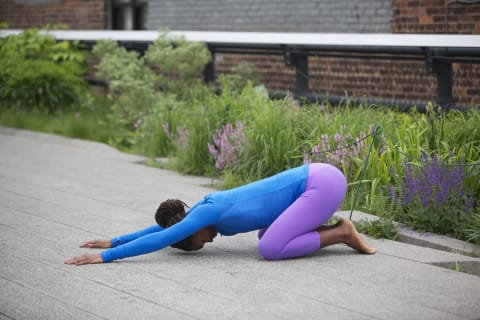
This gentle stretch calms the brain, helping to relieve stress and fatigue, relieves back and neck pain, and stretches hips, thighs and ankles.
From Downward Dog, bend your knees and kneel down to your mat and touch your big toes together, press your hips back toward your heels, separate your knees to hips-width and lay your torso down onto the floor or a bolster.
Rest your forehead on the mat, with your arms alongside your body and your palms facing upward. Breathe deeply into the back body for 5-to-10 breaths.
Standing Cat-Cow
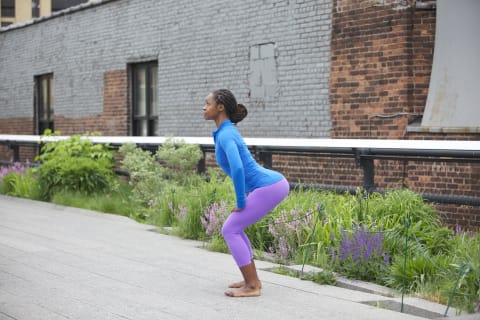
This series encourages spinal articulation and strengthens the muscles along your back and thighs, helping to support your ever-changing prenatal body. It also releases tension in the lumbar.
Stand in Mountain Pose with your feet hips-width apart on your mat and have two blocks handy. For an optional boost, you can place one block between the feet to make sure that they remain parallel, and take the other block and place it between your thighs and squeeze.
Take a deep inhale and raise your arms perpendicular to the floor, palms facing each other, and as you exhale, bend your knees parallel with the floor and send your hips back like you are sitting into a chair. This is called “Awkward Chair Pose.”
Tuck the tailbone slightly toward the floor and as you bend your knees, take the thighs more parallel and feel your torso leaning slightly forward above your thighs. Arms continue to reach overhead, unless you have high blood pressure, in which case the hands can stay on your hips or parallel to the floor.
Stay in the pose for about 20 seconds, and then come out of it with an exhalation — rounding the spine with hands on your knees and relaxing your head toward your chest.
On an inhale, bend your knees to send your belly forward and reach your right arm up. On the exhale, round your spine and take that arm down, relax your neck, and gaze at your belly. On the next inhale, send your belly forward with knees still bent and reach your left arm up.
Repeat 10 times.
Goddess Squats (Utkata Konasana)
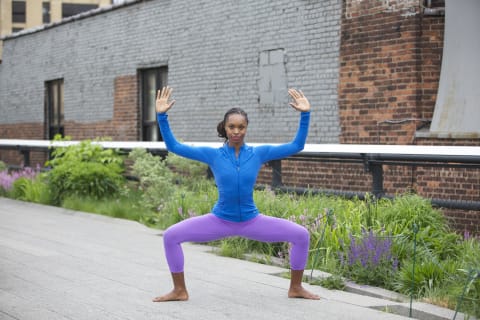
This series gets your legs in shape for the final stretch of labor — the pushing phase, or breathing your baby down. Your hips will be ready to deliver by opening the pelvic girdle, strengthening the thighs, opening the chest and strengthening the arms.
Take the legs wide with knees slightly turned out. Inhale the arms up overhead and exhale, bending the knees, bringing your thighs parallel with the floor. Open the arms out to either side with palms facing forward in Abhaya mudra — no fear. Inhale back up again and repeat up to 20 times.
Warrior II (Virabhadrasana II)
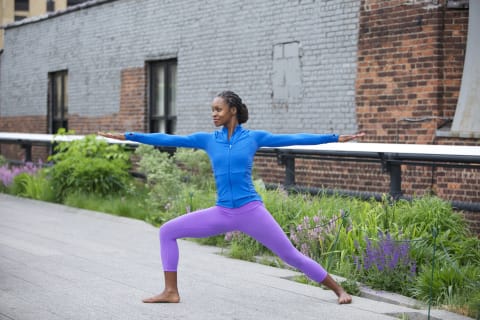
This pose cultivates mental and physical stamina, stretching the legs and ankles, groin, chest, ribs and shoulders. It relieves low back pain and sciatica as well. It is important not to sway the lower back, which is common as the belly grows bigger and the uterus pushes forward. This pose is beneficial during pregnancy because it really gives a sense of warrior strength and confidence.
Start with your feet parallel, hip-distance apart. Step your left foot back behind you at least one leg’s distance and turn your left foot out at a 60-degree angle. Extend your arms to the side away from your body on an inhale, bringing them parallel to the floor. Feel your chest open from your collarbone all the way up to your fingertips.
As you exhale, bend your front knee and firm up your thighs. Bring the front knee directly over the ankle and be sure that thigh is parallel to the floor. The back leg is active, stretching from the inner thigh to the pinky toe of your back foot. Drop your tailbone and draw that thigh muscle up.
Breathe all the way into your belly and as you exhale, straighten your front leg, keeping your arms extended (drop them by your side if you need a break). To switch sides, turn your front toes in and your back toes out, so you are reversing the position of the feet. Repeat with the left leg forward this time. To finish the pose, exhale and straighten your front leg. Step your back foot up to meet with the front with your hands on your hips.
Sacred Triangle Pose (Trikonasana)
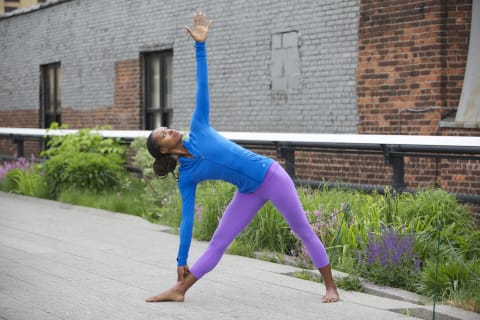
The triangle is used to represent water, earth and universal fertility. This pose will increase your stamina, improve flexibility of the torso, strengthen the ankles, feet and legs, while elongating the spine and opening the hips.
Start with legs together, feet turned out to a 45-degrees and heels touching. Then slide the left leg back behind you, and bend the right knee deeply. Make sure you turn those right toes forward, parallel with the length of your mat.
Inhale and stretch the arms out from the shoulders into a T-position, with palms facing down. Press the hips forward, hinge at the hip crease and reach the front fingertips straight ahead. Rest the bottom hand on the shin or a yoga block, and raise your top arm toward the ceiling, gazing at your top thumb. Feel the chest open in expansion.
Hold for 3 breaths and connect with the divine using the affirmation: “I am a powerful, creative force with sacred purpose.” Repeat on the other side.
Dove Series/Pigeon Pose (Eka Pada Rajakapotasana)
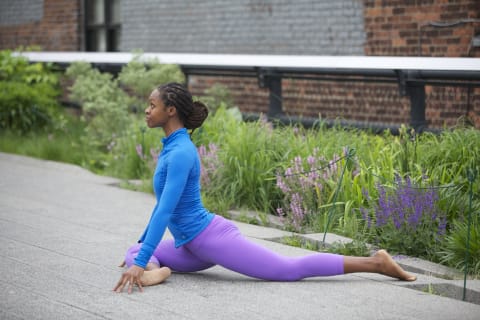
This pose stretches the hip flexors, outer hips and groin. There is nothing more elegant than a mom-to-be in this posture.
From Downward Dog, step the right foot forward and place it just inside your left hand. Tip your knee to the right, until it touches the floor — your shinbone should be almost parallel with the front of your mat.
Extend your chest forward, while supporting yourself on your fingertips. Try a few rounds of spinal flexion — waves of the spine — for 4 counts. You may also use a blanket or blocks underneath your hip to prop yourself up with a little support in this pose.
Hold this pose for a minimum of 5 breaths. Once you are finished, tuck the back toes under, press the hands into the floor and step back to Downward Dog. Repeat on the other side.
Supported Bridge Pose (Setu Bandha Sarvangasana)
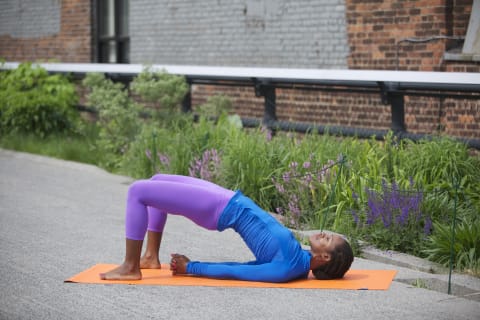
The anatomical focus of this pose is the uterus. Supported Bridge also stretches the chest, neck, and spine and allows a gentle backbend. The abdominal organs, lungs and thyroid are stimulated, and digestion is improved.
You’ll also notice a reduction in anxiety, fatigue, backache, headache and insomnia. This pose calms the mind and helps alleviate stress and mild depression, making it great for postpartum moms as well.
Lie on your back, bending the knees and pressing the soles of the feet into the floor. Bring the feet parallel and hip-distance apart. Lift your hips and slide the yoga block directly under your sacrum, resting the arms alongside you. Stay here for a few minutes, breathing deeply.
To come down, lift the hips and slide the block out from underneath you. Lie on your back and draw your knees in to happy baby position, then roll over to your left side and rest with props.
Now you should be stretched and ready to embrace what's to come.
Gallery Credit: Anders Krusberg for mindbodygreen
